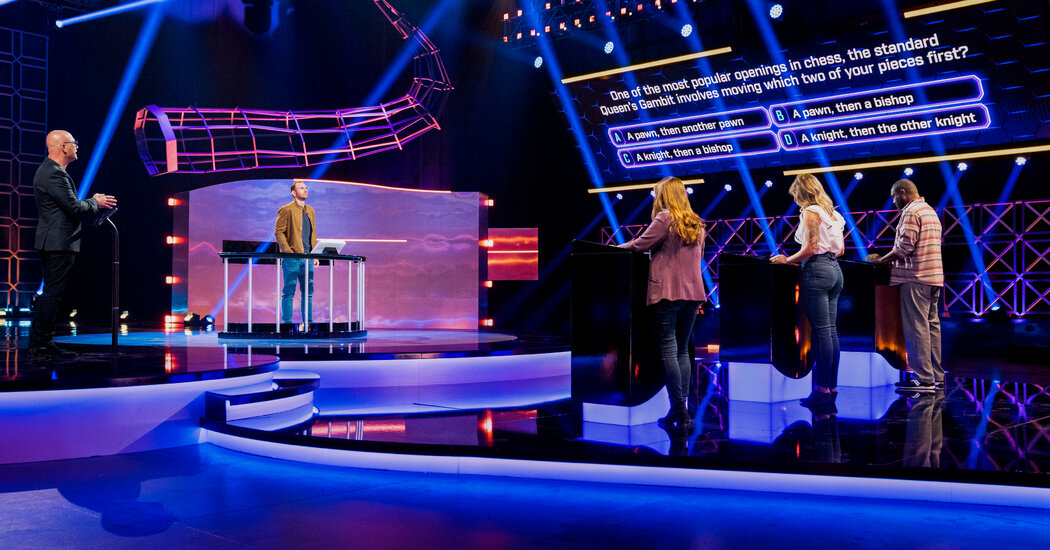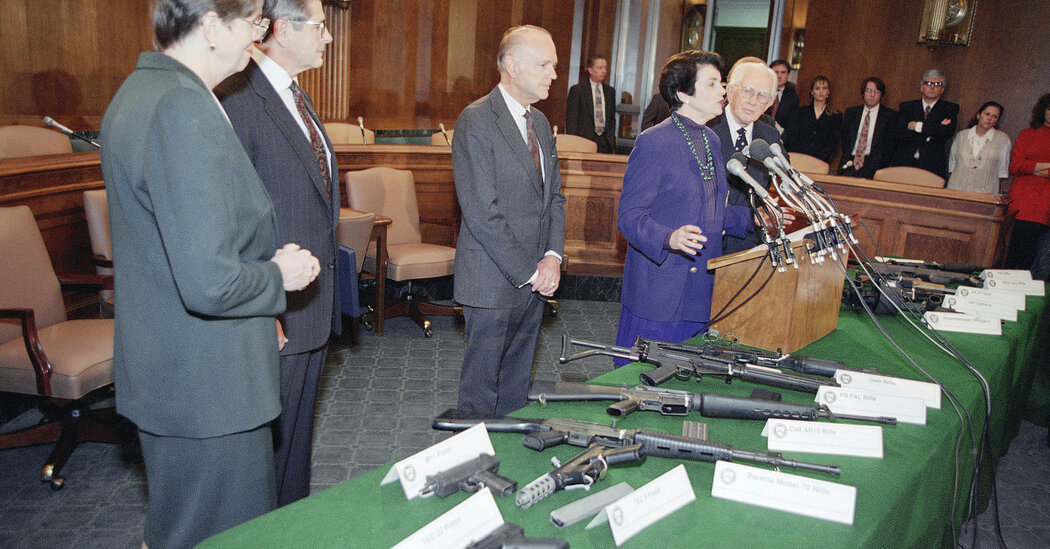
There are plenty of things on Netflix’s new quiz show that you’ve seen on game shows before. For starters, there’s Howie Mandel. There’s a big board of increasing cash prizes. There are contestants answering multiple-choice questions about science, history and geography. Sometimes — often, actually — they answer wrong.
That’s where the real game begins.
On “Bullsh*t the Game Show,” a lack of knowledge is no disqualification. It’s practically a requirement. In this trivia contest, being right is much less important than seeming right — a distinction that elevates an otherwise unremarkable game show into a fiendishly timely symbol of our scam-saturated culture.
After a contestant chooses an answer, we don’t know if it was correct or not. Instead, the player tells a story about how he or she supposedly knew the answer. Then three panelists decide whether they believe the story or not.
Finally, the real answer is revealed. If the contestant was right, it’s on to the next round. If the contestant was wrong, it’s still on to the next round — as long as at least one panelist got duped by the bogus explanation.
Players can win up to a million bucks while getting more answers wrong than right. “You know almost nothing,” Mandel tells one inaccurate contestant. “But it doesn’t matter!”
What does? Confidence. Personality. Vivid, but not overly vivid, examples. The knowledge that it is often easier to fool people not with a total fabrication but by taking actual facts — say, “My mother hated Kevin Costner” — and mashing them up with invented details into a true-false Frankenfiction.
You’ll notice I didn’t say “lie.” That’s because there’s an important difference between a lie and the game show’s subject, which is closer to the kind of bloviating hoo-hah that flows thick and freely through our public life.
In his essay “On Bullshit,” the philosopher Harry G. Frankfurt distinguishes between his title subject and mere lying. Lying requires that the liar recognize the truth. A liar knows that a certain thing is true and wants the audience to believe something false.
Bullshitting, on the other hand, is indifferent to the truth. Its practitioner, Frankfurt writes, “does not care whether the things he says describe reality correctly. He just picks them out, or makes them up, to suit his purpose.”
I’m sure this sounds like some people you know. It’s easy to look for parallels in politics: In 2016, Frankfurt identified Donald Trump, with his self-described “truthful hyperbole” and improvised campaign-stump fantasies, as a master of the art.
But it’s also in the scam sagas of Anna Delvey, Elizabeth Holmes, the Fyre Festival et al. It’s in influencer culture, which is also reflected in Netflix’s social-media reality show, “The Circle,” whose players can “catfish” others using fake personas and images. As mediated with social-app filters and judicious editing, a story doesn’t have to be 100 percent false to be totally phony.
Now, I doubt that the makers of Mandel’s new game show relied heavily on Frankfurt’s scholarship. (Unlike Frankfurt, Mandel and the players use the show’s title epithet and “lie” interchangeably.) But it’s not a bad functional illustration.
When a player spins a tale to rationalize a wrong answer, it’s not mainly out of a desire to hoodwink the panel about, say, what volcano shares its name with an Italian dish. (Spoiler: It’s Stromboli.) It’s out of a desire to deceive the panel as to whether the player knows which volcano and which dish.
In other words, the purpose is not to misrepresent the facts. The purpose to misrepresent the misrepresenter.
Game shows are the forgotten workhorses of TV, but they have a way of reflecting the values of their era. They tell us what it’s good to be good at. The egghead quiz shows of the ’50s and ’60s, like “The $64,000 Question,” reflected a nation that trusted experts and promoted education amid the Cold War and the space race — hence the existential crisis produced by the quiz-show scandals.
The populist ’70s saw a shift toward games, like “The Price Is Right,” that rewarded everyday skills like knowing the cost of a box of Rice-A-Roni. And the flashy, dramatic prime-time game shows of the 2000s — like Mandel’s Mephistophelian “Deal or No Deal” — echoed the reality shows they were competing with, by prizing risk-taking, cunning and an aptitude for game theory.
In 2022, the road to riches is paved with fertilizer. There have been other game shows, like “To Tell the Truth,” with elements of deception. But the Netflix show fully, playfully embodies the spirit of fake it till you make it. As Mandel says to the contestant Katie Dolan, a spirited communications consultant: “You come off like a really good soul. People believe you. And this is a skill!”
The show isn’t meanspirited; it just wears its comfort with our truth-optional times like a snakeskin suit. Compare that with “Jeopardy!,” that citadel of expert knowledge, which has struggled to find a replacement for Alex Trebek to bring its just-the-facts sensibility to the I-did-my-own-research era. Many of its fans were uncomfortable with the show’s hiring Mayim Bialik, who has questioned vaccination practices and endorsed a brain supplement that’s been described as pseudoscience.
Netflix’s show also indulges our undying fantasy that while the world is full of bull, you and I personally are smart enough to see through it. (As Alyssa Rosenberg wrote recently in The Washington Post, this is also part of the appeal of blind-scambition dramas like “The Dropout.”)
After all, when you watch it, who are you really “playing along” with? Not the contestants, the way you do with, say, “Wheel of Fortune.” The questions tend to be less the sort you can reason through and more of the “You know it or you don’t” variety. No, you play along with the panel, scouting for tics and tells and too-perfect details, testing your personal B.S. detector against theirs. You’re no sucker — right?
To be honest, beyond this pleasure, the show is mostly forgettable; it suffers from the draggy pacing of prime-time game shows like “Deal.” But there is something resonant about its post-truth concept. You can also find that, in a sweeter form, in Netflix’s celebration of fakery “Is It Cake?,” based on an internet meme, in which panelists guess whether objects are what they seem — designer bags, fast-food meals — or meticulous confectionary shams.
That’s the trompe l’oeil world we live in. Sometimes a beautiful invention is cake. And sometimes it’s something more pungent.




